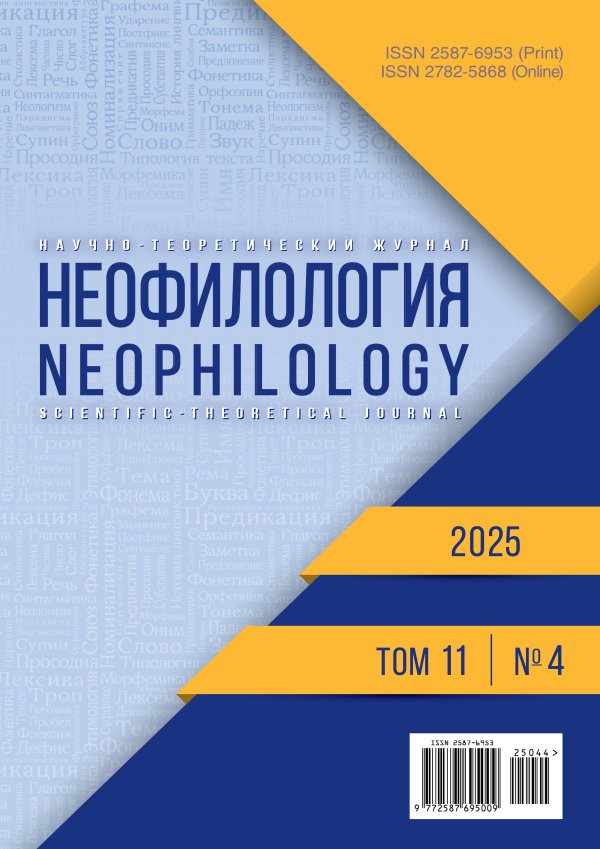Русизмы в диалектных названиях орудий охоты в якутском языке
- Авторы: Николаев Е.Р.1
-
Учреждения:
- Институт гуманитарных исследований и проблем малочисленных народов Севера Сибирское отделение Российской академии наук
- Выпуск: Том 11, № 1 (2025)
- Страницы: 31-41
- Раздел: ПАРАДИГМЫ ЯЗЫКОЗНАНИЯ И СОВРЕМЕННАЯ ЛИНГВИСТИКА
- URL: https://journal-vniispk.ru/2587-6953/article/view/295472
- DOI: https://doi.org/10.20310/2587-6953-2025-11-1-31-41
- ID: 295472
Цитировать
Полный текст
Аннотация
ВВЕДЕНИЕ. Рассмотрены заимствованные из русского языка диалектные названия орудий охоты в якутском языке. Изучение фонетических и семантических признаков русизмов в бытовой диалектной лексике якутского языка ранее не являлось предметом исследования у якутоведов. Актуальность исследования определяется тем, что в бытовой диалектной лексике представлен предметный мир, в котором отражаются основные принципы освоения русизмов. Целью исследования является описание фонетических и семантических особенностей заимствованных лексем из русского языка, которые обозначают орудия пассивной и активной охоты в диалектном пласте якутского языка.
МАТЕРИАЛЫ И МЕТОДЫ. Материалом исследования выступают диалектные слова, содержащиеся в диалектологических словарях якутского языка (1976, 1995 гг.). Использовались фонетический, семантический методы.
РЕЗУЛЬТАТЫ ИССЛЕДОВАНИЯ. Выявлено более 30 лексических единиц, заимствованных из русского языка, которые обозначают орудия охоты. Установлено, что русизмы подвергаются фонетизации в соответствии с основным правилом якутского языка – сингармонизма гласных звуков. Фонетическое освоение русизмов наиболее отчётливо проявляется в замене отсутствующих звуков в якутском языке на те звуки, в основе которых лежит их место образования, соответственно и классификация звуков (например, ё = үө, в = б, п = б). Определено, что семантика заимствований не подвергается существенным изменениям, так как названия орудий охоты относятся к тому разряду слов, которые обозначают конкретный предмет (инструмент, приспособление).
ЗАКЛЮЧЕНИЕ. Рассмотренная группа названий раскрывает характер заимствований в якутском языке, продиктованный изменением и развитием социально-бытовых условий жизни якутов, затронувший повседневный быт, в том числе внёсший изменения в состав охотничьих орудий и приспособлений.
Об авторах
Е. Р. Николаев
Институт гуманитарных исследований и проблем малочисленных народов Севера Сибирское отделение Российской академии наук
Автор, ответственный за переписку.
Email: 1953307@mail.ru
ORCID iD: 0000-0003-3782-8402
кандидат филологических наук, старший научный сотрудник отдела якутского языка
Россия, 677000, Российская Федерация, г. Якутск, ул. Петровского, 1Список литературы
- Акимова А.С. О терминологической лексике, относящейся к религиозным воззрениям древних кузнецов народа саха // Глобальный научный потенциал. 2024. № 6 (159). С. 209-212. https://elibrary.ru/rnkwyr
- Борисова Ю.М. Эвфемизмы в лексике охоты и рыболовства якутского языка // Актуальные проблемы лингвистики и литературоведения: сб. материалов 10 (24) Междунар. науч.-практ. конф. молодых учёных. Томск: Изд-во Томск. гос. ун-та, 2023. Вып. 24. С. 216-222. https://doi.org/10.17223/978-5-907572-02-7-2023-41, https://elibrary.ru/pzthfw
- Дьячковский Ф.Н., Пинигина О.Н. Семантическое пространство лексики материальной культуры в современном языке саха (на материале жилых построек) // Филологические науки. Вопросы теории и практики. 2019. Т. 12. № 2. С. 214-218. https://doi.org/10.30853/filnauki.2019.2.46, https://elibrary.ru/ywmntf
- Скрябина А.А. Древнетюркские слова в бытовой лексике якутского, хакасского и алтайского языков // Аммосов-2022: сб. материалов республиканской науч.-практ. конф., посвящ. 100-летию образования Якутской АССР. Якутск: Сев.-Вост. фед. ун-т им. М.К. Аммосова, 2022. С. 592-595. https://elibrary.ru/aaozbs
- Скрябина А.А. Общетюркская лексика в наименованиях орудий труда якутского языка (лексические параллели в тюркских языках Сибири) // Новые исследования Тувы. 2024. № 2. С. 300-315. https://doi.org/10.25178/nit.2024.2.18, https://elibrary.ru/kplyys
- Прокопьева А.К., Платонов П.С. Лексико семантические параллели якутского и алтайского языков (на материале названий орудий ручного труда и режущих и точильных инструментов) // Алтаистика. 2022. № 1 (4). С. 5-14. https://elibrary.ru/nixsgt
- Николаев Е.Р. Диалектные наименования мутовки в якутском языке (на материале лексикографических источников) // Сибирский филологический журнал. 2023. № 2. С. 194-207. https://doi.org/10.17223/18137083/83/15, https://elibrary.ru/itgyel
- Николаев Е.Р. Лексико-семантические особенности наименований кумысной кожаной посуды (сосудов) в якутском языке // Северо-Восточный гуманитарный вестник. 2021. № 1 (34). С. 96-107. https://doi.org/10.25693/SVGV.2021.34.1.010, https://elibrary.ru/nyqfza
- Готовцева Л.М. Заимствованная лексика традиционной одежды якутов // Томский журнал лингвистических и антропологических исследований. 2022. № 1 (35). С. 124-134. https://doi.org/10.23951/2307-6119-2022-1-124-134, https://elibrary.ru/lnpqsd
- Попов В.Г. Функциональные особенности некоторых видов традиционного холодного оружия якутов // Северо-Восточный гуманитарный вестник. 2019. № 2 (27). С. 28-38. https://doi.org/10.25693/SVGV.2019.02.27.03, https://elibrary.ru/hkobpr
- Иванова И.Б. Лексико-семантические группы имён существительных со значением части и доли предмета в якутском языке // Языки коренных народов как фактор устойчивого развития Арктики: сб. материалов Междунар. науч.-практ. конф. Якутск: ИГИиПМНС СО РАН, 2019. С. 67-69. https://doi.org/10.25693/NPK2019IvanovaIB, https://elibrary.ru/xbtlbr
- Харабаева В.И. Лексико-семантические группы глаголов действия и деятельности в якутском языке // Мир науки. Социология, филология, культурология. 2021. Т. 12. № 3. Ст. 2. https://elibrary.ru/dgcfou
- Данилова Н.И., Попова Н.И. Ландшафтная лексика в якутском языке // Северо-Восточный гуманитарный вестник. 2021. № 4 (37). С. 65-76. https://doi.org/10.25693/SVGV.2021.37.4.007, https://elibrary.ru/esozhk
- Васильева Н.М. Об орфографической адаптации в якутском языке начальных согласных в русскоязычных заимствованиях // Научный диалог. 2018. № 5. С. 41-48. https://doi.org/10.24224/2227-1295-2018-5-41-48, https://elibrary.ru/xpcpyd
- Васильева Н.М. О проблеме фонетизации заимствованных из русского языка слов // Вызовы и тренды мировой лингвистики: тр. и материалы Казан. Междунар. лингвист. саммита: в 2 т. Казань: Казан. фед. ун-т, 2021. Т. 2. С. 195-197. https://elibrary.ru/yrmmdh
Дополнительные файлы










